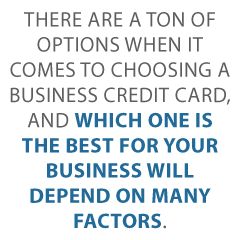Including 3 Surprising Things Other than Tax on Business Credit Card Rewards that May Impact Your Taxes
When choosing a credit card, whether personal or business, there are several factors to compare. Interest rate is probably the one most consumers consider first, followed closely by credit limit, and then rewards. Throw an annual fee in the mix, and you have even more to ponder. Back to the rewards thing though. Who doesn’t love a good reward? Cash back, points, airline miles galore, these are often the things that make the choice between one card or the other most interesting. When it comes to rewards however, one thing most do not consider is that they may have to pay a tax on business credit card rewards.
When Do You Have to Pay Tax on Business Credit Card Rewards?
Whether or not you pay tax on credit card rewards on your business credit cards will depend. Depends on what you ask? It depends on whether you had to spend money to get those rewards. For example, if you earn cash back, that would be a discount rather than income. It is therefore not taxable. The same is true if you earn points or travel miles as a percentage of the money you spend. If you earn $1 cash back for every $5 spent, that is considered a $1 discount, not $1 of income, and therefore not taxable.
If, however, all you had to do was open the account to earn the reward, and you did not have to spend anything to get it, then you may have to report it as income. This is the case with the bonuses that many credit card companies are fond of offering for opening an account with them. They may come in the form of cash, points, or miles. It doesn’t matter what form they take. If you didn’t have to do anything to get them, they are likely going to be taxable.
If your credit card information specifically states the funds are taxable, or if you receive a form 1099 from your credit card company, you can be sure there will be a tax impact. However, the absence of these two things does not set you free. A company only needs to to send a form 1099 if the amount is $600 or greater. Amounts under $600 are still taxable, but companies only have to send a form 1099 if the amount is over $600.
Real Life Example of Tax on Business Credit Card Rewards
In 2012, some Citibank card holders received frequent flyer miles as a gift for opening their accounts. At tax time, a 1099-Misc came in the mail. It indicated the miles had been reported to the IRS as income with a value of 2.5 cents per mile. As you can imagine, this was an unwelcome shock to most. Since they did not have to spend anything to receive the miles, the reward was taxable income.
Special Considerations for Tax on Business Credit Card Rewards
When it comes to tax on rewards from business credit cards, there are some special considerations that can affect the tax impact of the rewards.
Using Rewards to Offset Business Expenses
If you are using business credit card rewards to reduce the cost of business purchases, that affects the amount of a business expense that is tax deductible.
For example, if you purchase a new printer for your business for $300, and you offset the cost with rewards equal to $100, you can only deduct $200 as a business expense. In this way, business credit card rewards can still increase your taxable income, though they are not technically taxable as income directly.
Using Business Credit Card Rewards to Offset Personal Expenses
If you happen to use rewards earned on business credit cards for personal expenses, rather than business expenses, you will not have to worry about them reducing business expense and thus indirectly affecting your tax liability. The question has come up about whether rewards earned on business cards and used for personal purposes should be personal taxable income. The IRS has said no. They will not consider this to be taxable income. As a result, there is zero impact on your taxes from these rewards.
Charitable Donations
If you receive a $500 bonus for opening an account, that is taxable income because no spending took place to get those funds. If, however, you have the option to donate that amount to a charity, you do not have to report that $500 as income. And it is also tax deductible as a charitable contribution. It’s a win/win.
Recap: How Do You Avoid Tax on Business Credit Card Rewards?
What’s the takeaway? To best use your business credit card rewards with minimum tax impact, do the following:
Donate any bonuses, such as rewards not attached to required spending, to charity.
Use rewards such as cash back, points, or miles for personal expenses rather than to reduce business expense.
Then, balance the cost of the rewards versus how much you will actually benefit from them. For example, you may have a card with rewards that are good for you. But if it has a high annual fee, determine if the rewards benefit actually makes up for the cost of the annual fee. Do you pay $100 fee each year? Then be sure to earn more than $100 worth of useable rewards with that card annually.
Surprise! Here Are 3 Other Things that are Taxable that May Not Know
Now you know whether or not your credit card rewards are taxable, and how to avoid tax impact from business credit card rewards as much as possible, how about a few fun facts? Here are 3 things that are taxable that you probably did not realize.
Bitcoin
Yes, if your bitcoin is currently worth more than you paid for it, the gains are taxable just like with stocks and bonds. This also rings true of Bitcoin you get from your employer as compensation, a bonus, incentive, or even as a gift.
Gifts from an Employer
Speaking of gifts from employers, they are usually taxable. This includes more than cash bonuses. Did your boss give you an awesome new set of golf clubs or a weekend in his beach condo? That may be taxable too.
Bartering
This one was a total shock to me. One of my favorite small business budget hacks is to barter within my network for goods and services. It is not uncommon for small business owners to trade off for any number of things. Graphics, social media management, content writing, cleaning services, printing services, and more. The cash value of those trades can actually be taxable. Who knew? The IRS of course!
Do You Owe Tax on Business Credit Card Rewards? Maybe, Maybe Not
It all depends on how you got those rewards and what you do with them. Most credit card rewards are actually a discount, because they are directly related to some level of spending. These are not taxable, but they can still increase your taxable income by decreasing your business expense deduction if you choose to use them to reduce your business expenses. But if you choose to use those rewards to reduce personal expenses, they have no tax impact at all.
Bonuses for opening an account are different. They are taxable as income, even if they do not reach the $600 threshold to trigger a form 1099. This changes if you get the option to donate these funds to charity and choose to do so. Not only are they then not taxable, but they also count as a tax deduction.
The best option to avoid tax on business credit card rewards is to choose the card with the rewards that will best benefit you personally. Then you can redeem rewards for personal use. For bonuses, just donate them to charity if given the option. It looks good for your business, and it will only help you come tax time.
Always be careful to weigh the tax benefit of not using rewards for business expense against the actual benefit of the cost reduction however. You may find reduced expenses to be worth the cost come tax time.
This page contains affiliate links to products. We may receive a commission for purchases made through these links.



